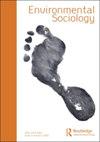Climate skeptics’ identity construction and (Dis)trust in science in the United States
IF 2.8
Q3 ENVIRONMENTAL STUDIES
引用次数: 6
Abstract
ABSTRACT In this paper we argue that climate change skepticism is an opinion-based social identity rooted in subjectively perceived marginality and exclusion from climate science. We use 33 interviews conducted with climate skeptics in Idaho and scholarship on social identity theory to examine identity construction among skeptics. Skeptics construct themselves as open-minded truth-seeking questioners of climate change and social outsiders who face ostracism from climate scientists, while concurrently producing an understanding of climate scientists as an oppositional identity: untrustworthy and exclusive. Skeptics’ identity construction provides insights into their trust/distrust judgments of climatology and suggests new pathways to effectively communicate climate change across social groups.美国气候怀疑论者的身份建构和对科学的不信任
本文认为,气候变化怀疑论是一种基于意见的社会认同,根植于主观感知的边缘化和被排除在气候科学之外。我们使用与爱达荷州气候怀疑论者进行的33次访谈和社会认同理论的奖学金来研究怀疑论者的身份建构。怀疑论者把自己塑造成思想开放、寻求真相的气候变化问题提问者和面临气候科学家排斥的社会局外人,同时把气候科学家理解为一种对立的身份:不值得信任和排他性。怀疑论者的身份建构提供了他们对气候学的信任/不信任判断的见解,并提出了在社会群体中有效沟通气候变化的新途径。
本文章由计算机程序翻译,如有差异,请以英文原文为准。
求助全文
约1分钟内获得全文
求助全文
来源期刊

Environmental Sociology
ENVIRONMENTAL STUDIES-
CiteScore
4.60
自引率
12.00%
发文量
34
期刊介绍:
Environmental Sociology is dedicated to applying and advancing the sociological imagination in relation to a wide variety of environmental challenges, controversies and issues, at every level from the global to local, from ‘world culture’ to diverse local perspectives. As an international, peer-reviewed scholarly journal, Environmental Sociology aims to stretch the conceptual and theoretical boundaries of both environmental and mainstream sociology, to highlight the relevance of sociological research for environmental policy and management, to disseminate the results of sociological research, and to engage in productive dialogue and debate with other disciplines in the social, natural and ecological sciences. Contributions may utilize a variety of theoretical orientations including, but not restricted to: critical theory, cultural sociology, ecofeminism, ecological modernization, environmental justice, organizational sociology, political ecology, political economy, post-colonial studies, risk theory, social psychology, science and technology studies, globalization, world-systems analysis, and so on. Cross- and transdisciplinary contributions are welcome where they demonstrate a novel attempt to understand social-ecological relationships in a manner that engages with the core concerns of sociology in social relationships, institutions, practices and processes. All methodological approaches in the environmental social sciences – qualitative, quantitative, integrative, spatial, policy analysis, etc. – are welcomed. Environmental Sociology welcomes high-quality submissions from scholars around the world.
 求助内容:
求助内容: 应助结果提醒方式:
应助结果提醒方式:


